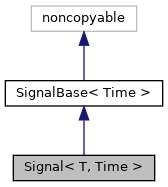Signals link I/O ports of entities. They can be constant-valued signals, or copy the value of a heap variable, or evaluated as a function. See SignalPtr and SignalTimeDependent for other types of signals, and SignalArray for a way of grouping them.
More...
#include <dynamic-graph/signal.h>
|
|
typedef int * | Mutex |
| |
|
typedef int * | MutexError |
| |
|
|
| Signal (std::string name) |
| |
|
virtual const T & | access (const Time &t) |
| |
|
virtual const T & | accessCopy () const |
| |
|
virtual std::ostream & | display (std::ostream &os) const |
| |
|
virtual void | get (std::ostream &value) const |
| |
|
virtual void | getClassName (std::string &aClassName) const |
| |
|
bool | getKeepReference () |
| |
|
| operator const T & () const |
| |
|
virtual const T & | operator() (const Time &t) |
| |
|
virtual Signal< T, Time > & | operator= (const T &t) |
| |
|
virtual void | recompute (const Time &t) |
| |
|
virtual void | set (std::istringstream &value) |
| |
|
virtual void | setConstant (const T &t) |
| |
|
virtual void | setFunction (boost::function2< T &, T &, Time > t, Mutex *mutexref=NULL) |
| |
|
void | setKeepReference (const bool &b) |
| |
|
virtual void | setReference (const T *t, Mutex *mutexref=NULL) |
| |
|
virtual void | setReferenceNonConstant (T *t, Mutex *mutexref=NULL) |
| |
|
virtual void | trace (std::ostream &os) const |
| |
|
| SignalBase (std::string name="") |
| |
|
virtual const Time & | getTime () const |
| |
|
virtual void | setTime (const Time &t) |
| |
|
const bool & | getReady () const |
| |
|
const std::string & | getName () const |
| |
|
void | getClassName (std::string &aClassName) const |
| |
|
virtual void | setPeriodTime (const Time &) |
| |
|
virtual Time | getPeriodTime () const |
| |
|
virtual void | addDependency (const SignalBase< Time > &) |
| |
|
virtual void | removeDependency (const SignalBase< Time > &) |
| |
|
virtual void | clearDependencies () |
| |
|
virtual bool | needUpdate (const Time &) const |
| |
|
void | setReady (const bool sready=true) |
| |
|
virtual std::ostream & | writeGraph (std::ostream &os) const |
| |
|
virtual std::ostream & | displayDependencies (std::ostream &os, const int=-1, std::string space="", std::string next1="", std::string="") const |
| |
|
virtual void | plug (SignalBase< Time > *sigarg) |
| |
|
virtual void | unplug () |
| |
|
virtual bool | isPlugged () const |
| |
|
virtual SignalBase< Time > * | getPluged () const |
| |
|
virtual void | setConstantDefault () |
| |
|
std::string | shortName () const |
| |
|
virtual void | ExtractNodeAndLocalNames (std::string &LocalName, std::string &NodeName) const |
| |
|
| enum | SignalType { CONSTANT
, REFERENCE
, REFERENCE_NON_CONST
, FUNCTION
} |
| |
|
|
bool | copyInit |
| |
|
bool | keepReference |
| |
|
Mutex * | providerMutex |
| |
|
SignalType | signalType |
| |
|
T * | Tcopy |
| |
|
T | Tcopy1 |
| |
|
T | Tcopy2 |
| |
|
boost::function2< T &, T &, Time > | Tfunction |
| |
|
const T * | Treference |
| |
|
T * | TreferenceNonConst |
| |
|
std::string | name |
| |
|
bool | ready |
| |
|
Time | signalTime |
| |
|
|
static const bool | KEEP_REFERENCE_DEFAULT = false |
| |
|
static const SignalType | SIGNAL_TYPE_DEFAULT = CONSTANT |
| |
template<class T, class Time>
class dynamicgraph::Signal< T, Time >
Signals link I/O ports of entities. They can be constant-valued signals, or copy the value of a heap variable, or evaluated as a function. See SignalPtr and SignalTimeDependent for other types of signals, and SignalArray for a way of grouping them.
There are several ways to specify the value output by a signal:
- using the function setConstant(T) to set the value of the signal to T;
- using the function setReference(mutex, T*) to set the value from a pointer, whose access is restricted by a mutex;
- using the function setFunction(boost::function2) that will be called when the signal's value is accessed.
Definition at line 41 of file signal.h.
The documentation for this class was generated from the following files:


 Public Member Functions inherited from SignalBase< Time >
Public Member Functions inherited from SignalBase< Time > Protected Attributes inherited from SignalBase< Time >
Protected Attributes inherited from SignalBase< Time >